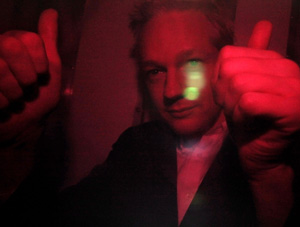Julian Assange says ‘justice not dead yet’ as bail granted
Julian Assange has walked out of the High Court in London exclaiming “justice is not dead yet” after being freed on bail by a judge pending extradition proceedings in the New Year.

Julian Assange was granted bail at the High Court after a senior judge rejected an appeal against a lower court’s decision earlier this week to release the WikiLeaks founder on strict conditional bail pending moves to extradite him to Sweden.
He told a press pack outside that “justice is not dead yet” after thanking his legal team and the British court system.
The 39-year-old Australian is wanted in Sweden for alleged sex offences.
Speaking earlier, Mark Stephens, lawyer for Julian Assange, said he was “utterly delighted” to win bail, adding that his client was the victim of a “continued vendetta”.
Bail conditions imposed at City of Westminster Magistrates’ Court earlier this week included the posting of a £200,000 cash deposit, with a further £40,000 guaranteed in two sureties of £20,000.
Journalist John Pilger told Channel 4 News that although he had been willing to put money forward, it was not necessary as Assange had enough people offering to do so.
Outside court, Mr Pilger called the decision to release Assange on bail “a little bit of justice.”
Explaining why he offered to help the WikiLeaks founder, Mr Pilger said “this is an innocent man until proven otherwise, and it is about the free flow of information, of which WikiLeaks is an exemplar.”
Assange is now expected to reside at the property of supporter and journalist Vaughan Smith in Suffolk.
‘Bail risk’
Gemma Lindfield, appearing for the Swedish authorities, told the judge there was “a real risk” that Assange would abscond if granted bail.
Ms Lindfield said there were “strong reasons” to believe he would fail to attend court for the full duration of the extradition hearing and to surrender to police if extradition was ordered.
She described Assange as living a nomadic lifestyle with no significant ties in the UK, and those offering to provide sureties had not known him long.
Rejecting her submissions and ordering conditional bail, the judge described how, shortly after he arrived in the UK from Sweden, Assange had been aware that the allegations against him in Sweden were still live.
He had made arrangements for his solicitors to be his point of contact with the Metropolitan Police so that, in the event of a search warrant being issued, the police would not have to search for him.
The judge said: “That is not the conduct of a person who is seeking to evade justice.”
‘Justice’
Vaughan Smith, founder of the journalists’ Frontline Club in London told Channel 4 News he had offered his property to Assange because he wanted “justice” for the WikiLeaks founder.
“I am a journalist and a former soldier. I am not uninformed about these matters. I expect I am going to get some flak, but my wife agreed with me about offering him a place to stay. I have children living with me, and Julian gets death threats. But I have complete confidence that the police will protect the address if they need to.
“I got to know Julian well over the last five months. As a journalist, I felt it is important to take a position on this issue. I think that Julian holds up a mirror that journalists like myself can look into, and perhaps we don’t always like what we see. I think journalism is getting closer to power and to the establishment than we have realised.”
The appeal application was heard at the High Court by Mr Justice Ouseley who last week, in another high-profile case, rejected an appeal by South African authorities and allowed bail pending extradition proceedings for Shrien Dewani, the husband of a woman murdered on honeymoon in South Africa.
Assange’s mother Christine arrived at court flanked by plain-clothes bodyguards and police officers. She did not comment.
A handful of supporters gathered, wearing T-shirts with an image of Assange and reading: “WikiLeaks, information wants to be free.”
Veteran campaigning journalist John Pilger, who put up a £20,000 surety, branded the case against Assange “ridiculous” and said he has support all over the world.
As he left the court, novelist Tariq Ali said Assange smiled as he was told he would be released on bail.
He said: “The atmosphere in court was one of general relief and smiles all around, apart from on the faces of the prosecution.
“Mr Assange smiled as well. His mother looked very relieved. He has been put through it so I think things are clearer now than after the last decision.
“All in all, it has been a good morning.”
<!–
–>
-
Latest news
-
‘Government responsiveness should be improved’ says infected blood inquiry chair4m

-
Infected Blood scandal: How UK failed on a global scale4m

-
‘There’s a strong evidential basis’ for ICC to grant arrest warrants for Netanyahu, says criminal law expert4m

-
International Criminal Court prosecutor seeks arrest warrants for Israel PM and Hamas leaders3m

-
‘Highly unlikely there was foul play’ in Iran president helicopter crash, says Tehran professor5m

-




